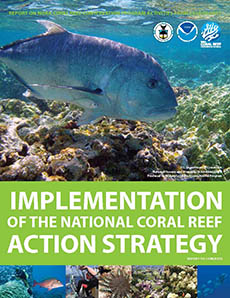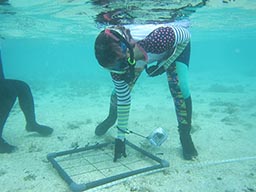- ABOUT US
- PROGRAM AREAS
- CONSERVATION APPROACH
- EDUCATION
- MULTIMEDIA
NOAA Delivers 2010-2011 Report to Congress

In September 2012, the NOAA Coral Program delivered to Congress the Implementation of the National Coral Reef Action Strategy: Report on NOAA Coral Reef Conservation Program Activities from 2010 to 2011 (pdf, 2.96 mb). The document is the fourth report on implementing the National Coral Reef Action Strategy. It highlights NOAA activities and accomplishments for Fiscal Years 2010 and 2011 and emphasizes collaborative efforts between NOAA and partners in Federal, State and Territory agencies, non-governmental organizations (NGOs), and academic institutions, among others. A few highlights of accomplishments follow.
In 2010 and 2011, the Coral Program focused on providing information and capacity for the creation, implementation and improvement of Marine Protected Areas (MPA). This included evaluating the effectiveness of different types of MPAs; identifying spawning aggregations for future protection; and collecting fishery-independent data to improve fishery management plans and provide context for fish population trends within MPAs. Minimizing destructive impacts from fishing and achieving responsible, ecosystem-based stewardship of reef fisheries pays lasting dividends to healthy coral reefs and to fishing livelihoods.
Coral reefs suffer major impairments from sediment runoff and from surges in algal cover caused by nutrient pollution. In 2010 and 2011, the Coral Program invested significantly in projects addressing land-based sources of pollution, including watershed management planning, building local capacity to address watershed issues, implementing best management practices to mitigate land based sources of pollution inputs, and monitoring the biological effects of land-based sources of pollution (e.g., biological surveys and analyses, measuring water chemistry and creating habitat maps to locate sensitive areas). Identifying and controlling land-based sources of pollution are a win for coral reefs and the water quality of watersheds draining to them.
In 2010, Coral Program launched its International Program to strengthen and expand U.S. involvement in international coral reef conservation efforts. The Coral Program's international efforts prioritize its work in support of regional ocean governance initiatives (i.e., Coral Triangle Initiative, Micronesia Challenge) in four international priority regions: the wider Caribbean, Micronesia, Samoa and the Southwest Pacific, and the Coral Triangle.
The Coral Program recognizes the need to better manage data and information produced to ensure accessibility, archiving, and use by NOAA and other partners. As such the Program is developing a Data Management Policy and a Data Management Plan. Finally, to track and measure its outcome-oriented goals, the Program designed a series of 18 performance measures to consistently and thoughtfully look at both intermediate and long-term outcomes. Thus, the Coral Reef Conservation Program can observe changes in the ecosystem measured through targeted monitoring and use this feedback in designing future strategies for coral reef conservation.
The CRCA also calls on NOAA to develop a national coral reef action strategy and to periodically review and revise the national action strategy and incorporate new and enhanced scientific understanding, increased management actions and the current condition of coral reef ecosystems, and relevant threats. The Coral Reef Conservation Program completed a strategic planning process in 2010 to refine the Program#39;s performance and efficiency measures and realign the focus of Program resources and external funding to address the top three recognized global threats impacting the world's coral reef ecosystems; climate change, fishing, and pollution. The Coral Reef Conservation Program has also expanded its international presence by becoming more actively involved in coral conservation efforts in Micronesia, the Southwestern Pacific, the Coral Triangle, and the wider Caribbean. Given the social, economic, and political aspects of coral reef management, the Coral Reef Conservation Program is increasing its social science portfolio to strategically engage local communities, better assess community impacts of management measures, and enhance efforts in education and outreach activities. Given these broad scale programmatic changes, an updated and refined National Coral Reef Action Strategy was developed as a component of this report and is included in Appendix II.
The Coral Reef Conservation Program's multidisciplinary approach of supporting cutting-edge coral reef monitoring, research, assessment, and education, outreach and community engagement is designed to improve the outlook for coral ecosystems worldwide and the people who depend on them. Coral ecosystems are valuable resources at risk and with effective leadership and management, healthy, resilient reef ecosystems can continue to provide a myriad of valuable services to current and future generations.
About Us

The NOAA Coral Reef Conservation Program was established in 2000 by the Coral Reef Conservation Act. Headquartered in Silver Spring, Maryland, the program is part of NOAA's Office for Coastal Management.

The Coral Reef Information System (CoRIS) is the program's information portal that provides access to NOAA coral reef data and products.
Work With US
U.S. Coral Reef Task Force
Funding Opportunities
Employment
Fellowship Program
Contracting Assistance
Graphic Identifier
Featured Stories Archive

Access the archive of featured stories here...
Feedback
Thank you for visiting NOAA’s Coral Reef Conservation Program online. Please take our website satisfaction survey. We welcome your ideas, comments, and feedback. Questions? Email coralreef@noaa.gov.
Stay Connected
Contact Us
NOAA’s Coral Reef Conservation Program
SSMC4, 10th Floor
1305 East West Highway
Silver Spring, MD 20910
coralreef@noaa.gov
